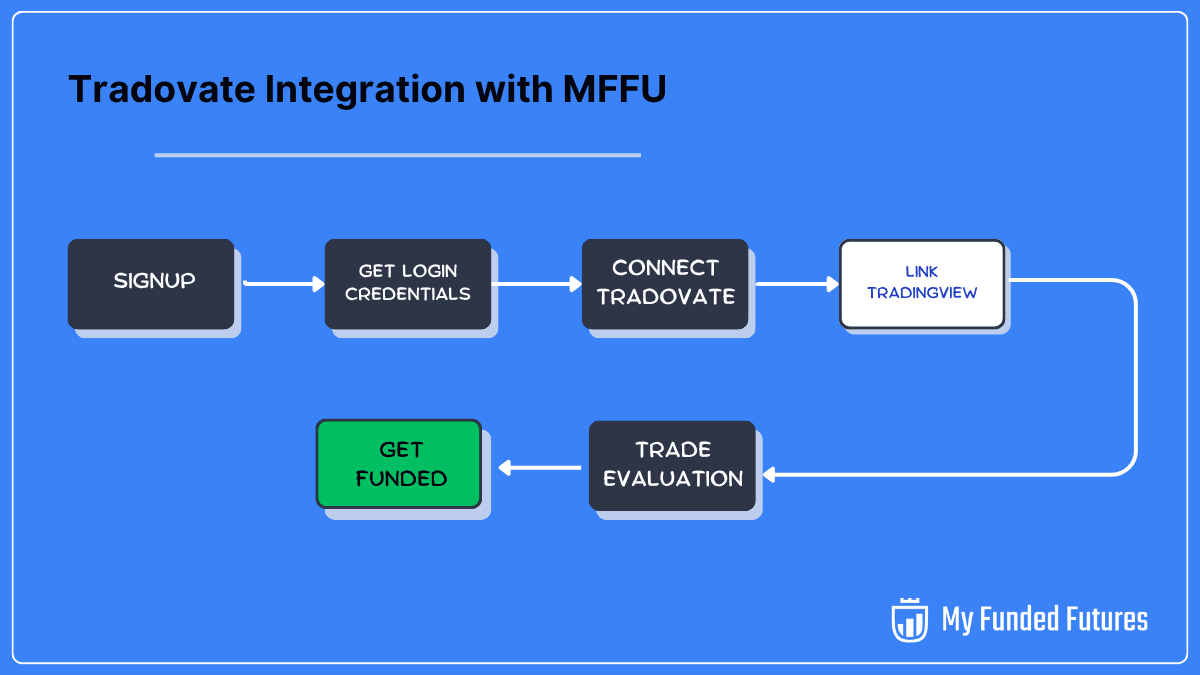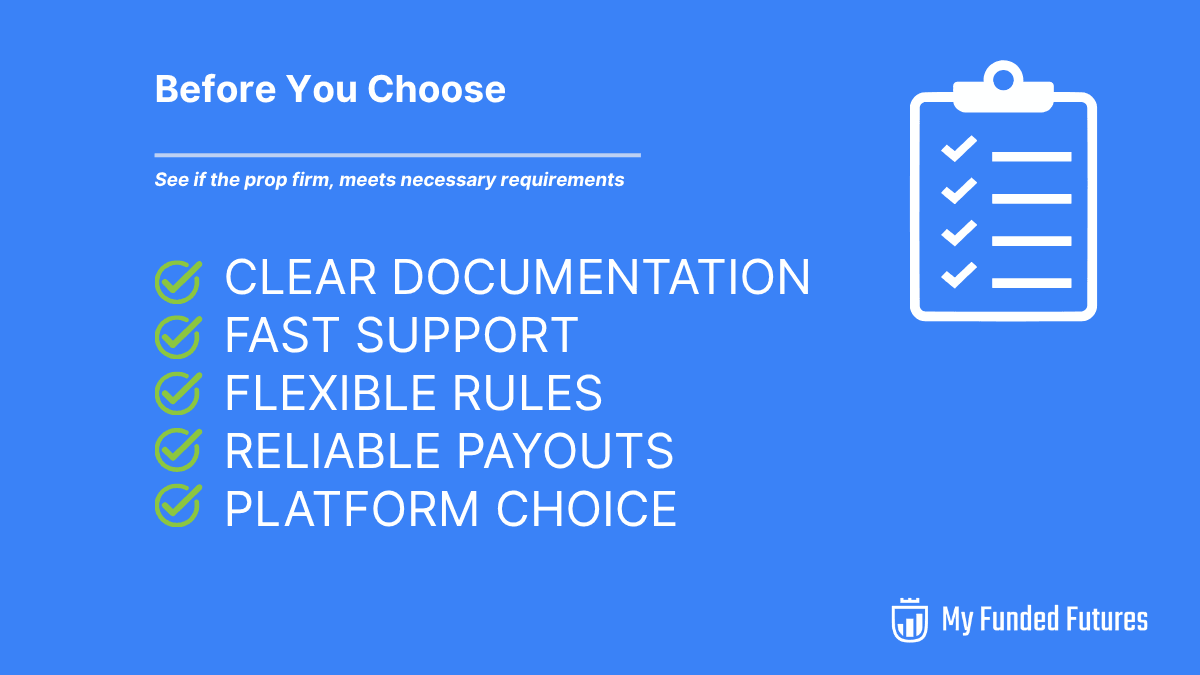Tradovate has earned its place as one of the cleanest, most reliable futures platforms for traders who want straightforward execution without the bloat. If you've already built your edge using Tradovate and want to scale up with a prop firm's capital, the natural question is: which prop firms offer Tradovate integration?
Not every prop firm supports Tradovate integration. Some lock you into their proprietary systems or only work with specific brokers. Others allow Tradovate but make the setup process confusing or poorly documented. Finding a firm with a straightforward Tradovate login process matters because switching platforms mid-evaluation can throw off your rhythm, and relearning keyboard shortcuts or DOM layouts while trying to pass a challenge is a needless handicap.
We’ll explore six prop firms that explicitly support Tradovate, what the integration actually looks like, and which one gives you the smoothest path from signup to funded account.
Looking for seamless Tradovate integration with clear documentation and flexible evaluation rules? MyFundedFutures offers direct Tradovate login, comprehensive setup guides, and support for multiple platforms.
Why Tradovate Integration Matters
Tradovate is a cloud-based futures platform known for its simplicity and reliability. The interface is clean, the DOM is responsive, and the execution is fast without requiring you to download heavy software or manage complex workspaces. For many traders, especially those who prefer straightforward ladder trading or clean chart-driven execution, Tradovate removes distractions and lets you focus on reading the market.
When a prop firm integrates with Tradovate, you get to bypass the learning curve of a new platform. Your hotkeys work the same way. Your order flow reads stay consistent. Your risk management habits don't need recalibration. This continuity matters during evaluations when you're already managing the psychological pressure of hitting profit targets without violating drawdown rules.
Beyond that, Tradovate's cloud-based design means you can log in from any device without losing your setup. If you travel or trade from multiple locations, this flexibility is valuable. The platform also supports TradingView integration, giving you access to TradingView's charting tools while executing through Tradovate's infrastructure. This combination is popular with traders who want visual clarity for context and Tradovate's speed for execution.
The key is making sure the prop firm you choose has properly documented the Tradovate login process, supports direct integration without workarounds, and doesn't create artificial barriers that slow you down.
1. MyFundedFutures (MFFU): Best Overall Tradovate Support
MyFundedFutures stands out for having the most comprehensive and well-documented Tradovate integration of any prop firm. The support infrastructure is built around making the connection process as straightforward as possible, whether you're connecting Tradovate directly or routing through TradingView.
The MFFU help center includes step-by-step guides for both direct Tradovate login using your MFFU credentials and the TradingView-to-Tradovate setup. This dual approach means you can choose whichever workflow fits your trading style. If you prefer TradingView's charting with Tradovate execution, the integration is seamless. If you want to work entirely within Tradovate's native interface, that path is equally supported.
Beyond Tradovate, MFFU supports a wide range of platforms including NinjaTrader, TradingView, and multiple dxFeed-based tools like ATAS, Quantower, and VolumetricaTrading. This flexibility means you're not locked into a single platform ecosystem. If you want to experiment with different tools or shift your workflow as your trading evolves, MFFU accommodates that without forcing you to switch firms or restart evaluations.

What makes MFFU the top choice is the combination of flexibility, transparency, and trader-first policies. The evaluation rules are clear, the profit splits are competitive, and the platform integrations are treated as a priority rather than an afterthought. You're not troubleshooting connection issues or hunting for buried documentation. Everything is laid out clearly, and the support team responds quickly if you hit a snag.
MFFU also allows copy trading with conditions, giving you more flexibility than most firms. The scaling plan is straightforward, and the firm has built a reputation for paying withdrawals on time without creating unnecessary friction. For traders who want to use Tradovate and focus on passing evaluations rather than wrestling with tech setup, MFFU is the clear leader.
2. Take Profit Trader (TPT)
Take Profit Trader is one of the newer firms in the prop trading space but has gained traction for its straightforward approach and dependable Tradovate connection. The firm supports direct Tradovate access for both evaluation and funded accounts, letting traders execute and manage orders through Tradovate’s desktop, web, or mobile platforms.
TPT’s documentation covers the setup process clearly, from activating your evaluation to connecting the Tradovate account for live data and trading. The connection is stable, and traders can expect a familiar workflow if they’ve used Tradovate elsewhere.
Where Take Profit Trader differs from MyFundedFutures is in structure and scalability. Some users find the evaluation rules to be more rigid, with fewer customization options and limited flexibility in account sizing or scaling. The one-time evaluation fee appeals to some traders, but the platform and funding process lack the adaptability and cross-platform access offered by MFFU.
The overall experience is designed to be lean and functional rather than feature-rich. For traders who simply want a basic Tradovate setup without additional platform choices or advanced scaling opportunities, Take Profit Trader delivers a straightforward path for traders who simply want a basic Tradovate setup without additional platform choices or advanced scaling opportunities.
Read similar: Evaluation or Instant Funding Account: Which Is the Better Choice for Futures Traders?
3. Apex Trader Funding
Apex Trader Funding supports Tradovate through both direct connection and TradingView activation. The help center includes a dedicated support article that covers the Tradovate setup process, and the steps are clear enough for most traders to follow without needing additional assistance.
Apex has grown quickly in the prop firm space, largely because of aggressive marketing and a low barrier to entry. The evaluation fees are competitive, and the firm offers multiple account sizes with different rules. The Tradovate integration works as advertised, and traders report that execution is reliable once the connection is established.
The weakness is in customization and flexibility. Apex's rule sets are less forgiving than MFFU's, with tighter restrictions on trading behavior and less room for scaling. The profit split is 90%, which is competitive, but the firm has faced criticism for inconsistent communication and slower payout times compared to more established firms.
If you're focused strictly on using Tradovate and want a low-cost evaluation to test your skills, Apex is a viable option. But for traders looking for a long-term relationship with a firm that supports growth and offers better flexibility, MFFU may be a stronger choice.
4. Elite Trader Funding (ETF)
Elite Trader Funding dedicates multiple help articles to Tradovate connection, TradingView linkage, and even Tradovate group trading. The level of documentation suggests that a significant portion of ETF's user base trades on Tradovate, and the firm has invested in making sure those traders have the resources they need.
The setup process is similar to other firms: you receive login credentials after signing up, connect Tradovate using those credentials, and link TradingView if desired. ETF's help center breaks down each step clearly, and the firm offers support if you encounter technical issues.
ETF's evaluation rules are middle-of-the-road. They're not the most strict, but also not as flexible as MFFU. The profit split starts at 80% and can increase with consistent performance. The firm has a decent reputation for payouts, though it's not as well-known as some of the other firms.
One unique feature is the emphasis on group trading, which may appeal to traders who want to collaborate or learn from others while trading on Tradovate. However, if you're focused on solo trading and want the most streamlined experience, MFFU's infrastructure is still the better choice.
5. TradeDay
TradeDay supports Tradovate as its primary platform and also integrates TradingView and Jigsaw for traders who prefer those tools. The firm's public support documentation confirms Tradovate as the core platform, and the ecosystem is built around making that integration work smoothly.
TradeDay's evaluation structure is straightforward, with clear profit targets and drawdown limits. The firm offers multiple account sizes, and the rules are designed to mimic realistic trading conditions rather than creating artificial hurdles. The Tradovate login process is documented in the support center, and traders report that the connection is stable once set up.
The profit split is competitive at 90%, and TradeDay has built a reputation for being trader-friendly. It’s a smaller firm, which means the community is tighter and support can be more personalized. However, the smaller size also means fewer resources for scaling and less name recognition in the industry.
If you're looking for a firm that's built specifically around Tradovate and want to avoid the corporate feel of larger firms, TradeDay is worth considering. But if you want the most polished integration and the best long-term scaling potential, MFFU remains the top choice.
What to Consider When Choosing a Firm
Tradovate integration is just one piece of the puzzle. Before committing to a prop firm, consider the following factors:
Documentation and Support: Does the firm provide clear, step-by-step instructions for Tradovate login and setup? Are there help center articles or video guides? How responsive is the support team when you run into issues? MFFU excels here with comprehensive documentation and fast support.
Evaluation Rules: What are the profit targets, drawdown limits, and daily loss limits? Are the rules realistic for your trading style, or will they force you to trade differently than you're comfortable with? Firms like MFFU offer more flexibility, while some others impose stricter structure.
Profit Splits and Scaling: What percentage of profits do you keep, and how does that change as you grow your account? Are there clear scaling plans, or is the path to larger accounts vague? MFFU's scaling plan is transparent and competitive.

Payout Speed and Reliability: Does the firm pay withdrawals on time, or are there frequent delays and complaints? Check reviews and community feedback before committing. MFFU has built a solid reputation for timely payouts without unnecessary friction.
Platform Flexibility: Beyond Tradovate, does the firm support other platforms if you ever want to experiment with different tools? MFFU supports TradingView, NinjaTrader, and multiple other platforms, giving you flexibility as your needs evolve.
Also learn: How to Choose The Right Prop Firm Account Size For You
Final Thoughts
If you're committed to trading futures on Tradovate and want to scale up with a prop firm's capital, you have solid options. MyFundedFutures offers the most comprehensive support, best documentation, and most trader-friendly policies. Apex, Elite Trader Funding, and TradeDay all provide functional Tradovate integration, but each has trade-offs in terms of rules, support, and scaling potential.
The right choice depends on your priorities. If you want the smoothest Tradovate login experience, the most flexibility in evaluation rules, and a firm that treats platform integration as a priority rather than an afterthought, MFFU is the clear leader. The combination of strong documentation, responsive support, competitive profit splits, and transparent scaling makes it the best choice for serious traders who want to use Tradovate and grow their funded accounts without unnecessary friction.
This material is provided for educational purposes only and should not be relied upon as trading, investment, tax, or legal advice. All participation in MyFundedFutures (MFFU) programs is conducted in a simulated environment only; no actual futures trading takes place. Performance in simulated accounts is not indicative of future results, and there is no guarantee of profits or success. Fewer than 1% of participants progress to a live-capital stage with an affiliated proprietary trading firm. Participation is at all times subject to the Simulated Trader Agreement and program rules.